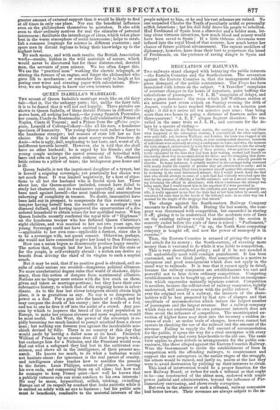QUEEN ISABELLA'S MARRIAGE.
Tan acount of Queen Isabella's marriage reads like an old fairy tale—that is, like the unhappy parts ; but, unlike the fairy tale, it is to be feared that it will not end happily. Three pictures are shown to Queen Isabella, of three distant Princes in different cli- mates born all seeking her hand,—the young Spanish Pretender,
her cousin, de Montemolin ; the half ecclesiastical Prince of Naples, Conte di Trapani and a Prince from the offeina eonju- gium, Leopold of Coburg-bohary—like all his race, a handsome specimen of humanity. The young Queen took rather a fancy to the handsome stranger • but reasons of state left her no free choice. She is told that she must marry cousin Francisco de Assis—who is ugly, dull, unpleasing to her taste, and, worst of all, indifferent towards herself. However, she is told that she shall have no other husband; he is urged by his friends • and the young couple undergo the sacred ceremony of betrothal with tears and sobs on her part, sullen sadness on his. The affianced bride retires to a pillow of tears; the bridegroom goes home and is ill.
Queen Isabella is not the imprisoned daughter of a tyrant, but is herself a reigning sovereign; yet practically her choice was not much freer. It was limited negatively, by a host of objec- tions to all but the husband who is forced upon her. Those about her, the Queen-mother included, cannot have failed to study her character, and its weaknesses especially ; and she has been used against herself—the most insidious and unscrupulous suborning of complicity in treason. No doubt, immunities have
be en out in prospect, to compensate for this restraint ; one tempter having herself been the sacrifice in a inarriage with a diseased dullard, and having improved the opportunities of a dis- ordered household to obtain solace for her mortified tastes. When Queen Isabella recently conferred the royal title of "Highness" on the handsome trooper who has fathered Queen Christina's eight children, and was married to her not two years ago the young Sovereign could not have omitted to draw a commentary —applicable to her own case—applicable it fortiori, since she is to be a sovereign wife, not queen consort. Otherwise, perhaps, she would not have consented to give her hand to Don Francisco. How can a union begun so disastrously produce happy results? The notion that, though bad for her, it is good for the state or i for the people, s self-evidently absurd : a nation can derive no benefit from driving the chief of its virgins to such a nuptial couch.
But it may be said, that if no positive good is obtained, evil re- sults of other unions are avoided—dangerous political alliances. No more unsubstantial dogma rules that world of shadows, diplo- macy, than this notion of dangers from matrimonial alliances. Nations are no longer mere estates with the live stock on them, given and taken as marriage-portions ; but they have their own substantive history, to which that of the reigning house is subor- dinate. As to the fear lest clever intriguers should obtain high place, it is as gratuitous as any. No one is so dangerous in power as a fool. Put a gun into the hands of a villain, and he may compass the death of his enemy ; into the hands of a fool, and ten to one he fires it off into the midst of a crowd. Any pro- cess by which to improve the breed of the royal population in Europe, to make her princes cleverer and more sagacious, would be most usefuL In the West, the power of the sovereign is ra- pidly becoming- too much limited to permit mischief from a clever man • but nothing can forearm you against the incalculable mis- chiefs devised by folly. There is no country at this day that would profit by having a duller man at its head. Frederick William of Prussia by no means does all that his people wish ; but exchange him for a Nicholas, and the Prussians would soon find out what a safeguard they had lost in the cultivated con- science, and above all in the intelligence, of their present mo- narch. He knows too much, to do what a barbarian would not hesitate about : for ignorance is the real parent of cruelty, and intelligence alone teaches how to sacrifice the present to the future. Louis Philippe, astutest of princes, is serving his own ends, and compassing them on all sides; but how well he manages to keep France quiet—how well he knows that it„publicly virtuous rule can alone conduce to his own interests ! He may be mean, hypocritical, selfish, tricking, swindling Europe out of its respect by conduct that looks patriotic while it is earned on solely with an eye to business ; but his public acts moat be beneficent, conducive to the material interests of the
people subject to him, or he and his vast schemes are ruined. No one suspected Charles the Tenth of peculiarly artful or personally selfish intentions ; hut his dull folly drove his people to rebellion. Had Ferdinand of Spain been a shrewder and a bolder man, let- ting alone virtuous intentions, how much blood and misery would have been saved to Spain ! If a little Orleans cleverness were infused into the royal blood of that country, how much better her chance of future political advancement. The sapient meddlers of diplomacy, however, have done their best to perpetuate the breed of Ferdinands, on the pretence of saving danger to Spain and Europe!


























 Previous page
Previous page